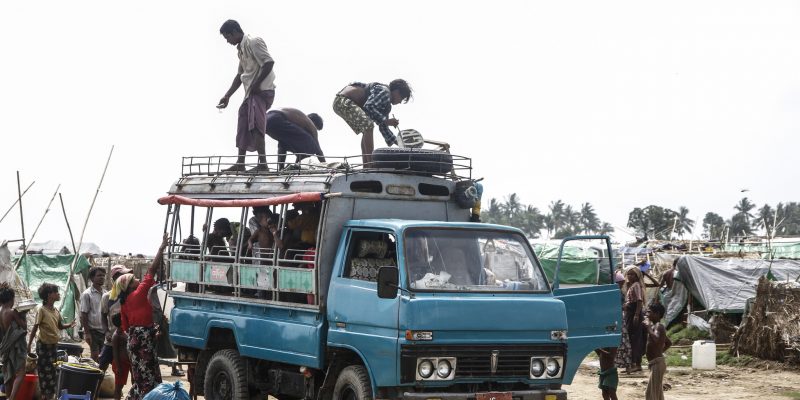Deemed the fastest growing refugee crisis since the Rwandan genocide, the mass exodus of Rohingya from Myanmar’s Rakhine State into Bangladesh has commanded international attention since late August. As of November 17th, nearly 620,000 Rohingya have crossed into the district of the town of Cox’s Bazar, with 400,000 having fled over the span of three weeks alone. Thousands more are stranded in no-man’s land along the Bangladesh-Myanmar border—hungry, traumatized, and prey to landmines laid by Myanmar’s security forces to prevent them from fleeing.
As the crisis nears its third month, refugee flows and violence against the Rohingya show few signs of abating. Yet despite ongoing displacement and insecurity, reports that Myanmar and Bangladesh were planning to repatriate Rohingya refugees emerged as early as October 2nd, culminating in a ten-point agreement just weeks later. This October 25th agreement calls for “stopping immediately entry by Myanmar nationals into Bangladesh” and the “repatriation of refugees at the earliest date and restoring [of] normalcy in Rakhine Region for their resettlement.”
The repatriation deal was stalled for several weeks by the two countries’ squabbling, the Rohingya gaining temporary respite from forced return to Myanmar as a result. Myanmar officials accused Bangladesh of refusing to cooperate in order to reap the benefits of international aid. Bangladesh contended that the agreement fell through due to Myanmar’s own ineptitude.
However, as Bangladesh grapples with becoming one of top five refugee-hosting states virtually overnight and as Myanmar’s international legitimacy lays on the line, the deal has recently resurfaced. On November 14th, Myanmar’s de facto leader Aung San Suu Kyi promised to facilitate a mass repatriation campaign of the Rohingya, which would conclude “within three weeks” of the signing of a memorandum of understanding with Bangladesh. Myanmar’s foreign minister has assured that the wish of those Rohingya who want to return “of their own will” is one of four “strict” conditions on their repatriation. However, Suu Kyi’s assertion that all Rohingya wish to return to Myanmar and the Myanmar government’s approximation that it can only process around 150 returns a day leave the prospect of truly voluntary repatriation campaign in doubt.
If we are truly concerned about the Rohingya’s protection as an international community, then we must move swiftly to nip this repatriation deal in the bud. Yet despite intense international scrutiny of the horrific abuses committed against the Rohingya, little protest has been raised against the repatriation deal itself. Instead, statements from high-profile individuals, such as Kofi Annan, have only underscored the responsibility of all parties involved to allow the Rohingya to swiftly and safely return to their homes.
To be fair, these statements have come loaded with certain conditions: that these returns must be voluntary, that the Rohingya ought to play a key role in the planning and management of their own homecoming, and that Myanmar must provide the presently stateless returnees full citizenship. Yet, perhaps out of deference to Myanmar and Bangladesh’s national sovereignty, these statements fail to underscore the risk that premature returns pose to already vulnerable Rohingya refugees.
The bottom line is that to allow the repatriation deal to come to fruition now is to subject the Rohingya to large-scale refoulement—the forcible return of refugees to a country where they will likely be in danger of persecution. Bangladesh and Myanmar are not signatories to the 1951 Refugee Convention, the international legal instrument that endows refugees and asylum-seekers with certain rights and states the responsibility to uphold them. However, the duty to not return refugees to their peril, non-refoulement, remains a customary principle of international law to which all states are bound. Thus, it is our duty as onlookers to the Rohingya’s plight to ensure that it is respected.
How can we regard repatriation as acceptable when conditions in Myanmar are far from safe for the Rohingya? Safe returns are simply not possible when anti-Rohingya pogroms by Myanmar’s military and Buddhist nationalists continue to blaze throughout Rakhine state, when international relief organizations and Rohingya sympathizers have been violently attacked, and when Myanmar’s military continues to deny that it is responsible for the Rohingya’s flight. Persecution against the Rohingya is not a recent occurrence, but is instead cyclical. Waves of violence against them stretch as far back as the 1970’s with impunity, as the Rohingya have been stateless and branded as enemies of the state for over three decades. Conditions must fundamentally change at both the levels of government and society before even discussions of repatriation can be legitimate.
Moreover, the wishes and concerns of the Rohingya, who, after all, have the most at stake in these discussions, have not been consulted. It is they who most vividly remember the consequences of premature repatriation efforts past.
In 1978, approximately 200,000 Rohingya sought safety in Bangladesh, fleeing large-scale violence that followed state-led efforts to weed out “foreigners” from “citizens.” These efforts included the mass destruction of the Rohingya’s citizenship documents, forcible evictions, rape, and murder. Following insistence from Bangladesh, a repatriation effort was carried out, whereby the refugees were starved out of camps. Rather than being met with improved conditions upon their return, Myanmar introduced the 1982 Citizenship Act, which has definitively excluded the Rohingya from citizenship to this day.
Another disturbing mass repatriation effort took place in the early 1990s. As documented by UNHCR, less than ten percent of Rohingya surveyed at the time expected to return to safe conditions in Myanmar. Their anti-repatriation efforts were met by excessive force from Bangladesh to push them back across the border.
The Rohingya’s conditions in Myanmar have not improved, if not gotten worse. Before this most recent influx, there were at least 200,000 known Rohingya in Bangladesh who fled earlier waves of communal violence. As the Commander-in-Chief of the Myanmar Armed Forces, General Min Aung Hliang, has made clear, these cyclical waves of anti-Rohingya violence have no end in sight and will continue with impunity. The erasure of the Rohingya from Myanmar has become a national imperative—“unfinished business” from the past. Safe returns are simply not a possibility at this point in time.
We must not fall prey to historical amnesia when examining our options for the Rohingya. Myanmar and Bangladesh have struck repatriation deals not only without the Rohingya’s best interests in mind, but also to the risk of their lives. While allowing the refugees to someday return to their ancestral homes in full dignity and comfort is ideal, conditions at home are far too perilous to allow a systematic repatriation campaign at the present. Myanmar’s treatment of the Rohingya is now widely recognized as a textbook example of ethnic cleansing, and to others as a form of “slow-burning genocide.”
In light of this, we must form a uniform front against the current repatriation plan. We owe it to humanity to learn from mistakes past.
Cover photo: Steve Gunaer (CC BY-NC 2.0)










